Assessment of Income and Deductions under Income Tax Assessment Act 1997
VerifiedAdded on 2023/06/03
|7
|2253
|329
AI Summary
The study evaluates the various deductions available to individuals under the Income Tax Assessment Act 1997 in Australia. It discusses the eligibility for claiming deductions and the conditions to be fulfilled. The study also analyzes a case related to the deduction of expenses in respect of interest and expenses associated with rental property.
Contribute Materials
Your contribution can guide someone’s learning journey. Share your
documents today.
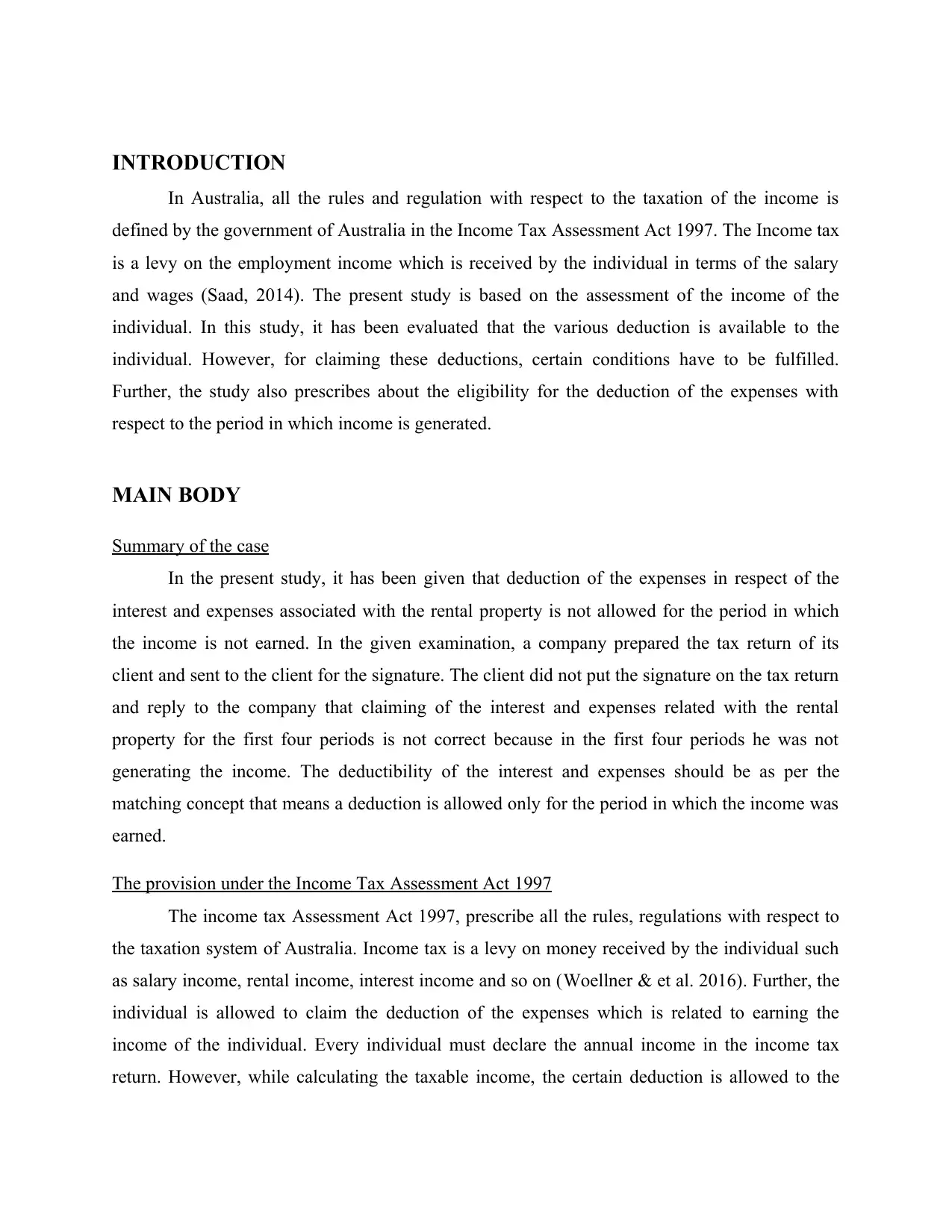
INTRODUCTION
In Australia, all the rules and regulation with respect to the taxation of the income is
defined by the government of Australia in the Income Tax Assessment Act 1997. The Income tax
is a levy on the employment income which is received by the individual in terms of the salary
and wages (Saad, 2014). The present study is based on the assessment of the income of the
individual. In this study, it has been evaluated that the various deduction is available to the
individual. However, for claiming these deductions, certain conditions have to be fulfilled.
Further, the study also prescribes about the eligibility for the deduction of the expenses with
respect to the period in which income is generated.
MAIN BODY
Summary of the case
In the present study, it has been given that deduction of the expenses in respect of the
interest and expenses associated with the rental property is not allowed for the period in which
the income is not earned. In the given examination, a company prepared the tax return of its
client and sent to the client for the signature. The client did not put the signature on the tax return
and reply to the company that claiming of the interest and expenses related with the rental
property for the first four periods is not correct because in the first four periods he was not
generating the income. The deductibility of the interest and expenses should be as per the
matching concept that means a deduction is allowed only for the period in which the income was
earned.
The provision under the Income Tax Assessment Act 1997
The income tax Assessment Act 1997, prescribe all the rules, regulations with respect to
the taxation system of Australia. Income tax is a levy on money received by the individual such
as salary income, rental income, interest income and so on (Woellner & et al. 2016). Further, the
individual is allowed to claim the deduction of the expenses which is related to earning the
income of the individual. Every individual must declare the annual income in the income tax
return. However, while calculating the taxable income, the certain deduction is allowed to the
In Australia, all the rules and regulation with respect to the taxation of the income is
defined by the government of Australia in the Income Tax Assessment Act 1997. The Income tax
is a levy on the employment income which is received by the individual in terms of the salary
and wages (Saad, 2014). The present study is based on the assessment of the income of the
individual. In this study, it has been evaluated that the various deduction is available to the
individual. However, for claiming these deductions, certain conditions have to be fulfilled.
Further, the study also prescribes about the eligibility for the deduction of the expenses with
respect to the period in which income is generated.
MAIN BODY
Summary of the case
In the present study, it has been given that deduction of the expenses in respect of the
interest and expenses associated with the rental property is not allowed for the period in which
the income is not earned. In the given examination, a company prepared the tax return of its
client and sent to the client for the signature. The client did not put the signature on the tax return
and reply to the company that claiming of the interest and expenses related with the rental
property for the first four periods is not correct because in the first four periods he was not
generating the income. The deductibility of the interest and expenses should be as per the
matching concept that means a deduction is allowed only for the period in which the income was
earned.
The provision under the Income Tax Assessment Act 1997
The income tax Assessment Act 1997, prescribe all the rules, regulations with respect to
the taxation system of Australia. Income tax is a levy on money received by the individual such
as salary income, rental income, interest income and so on (Woellner & et al. 2016). Further, the
individual is allowed to claim the deduction of the expenses which is related to earning the
income of the individual. Every individual must declare the annual income in the income tax
return. However, while calculating the taxable income, the certain deduction is allowed to the
Secure Best Marks with AI Grader
Need help grading? Try our AI Grader for instant feedback on your assignments.
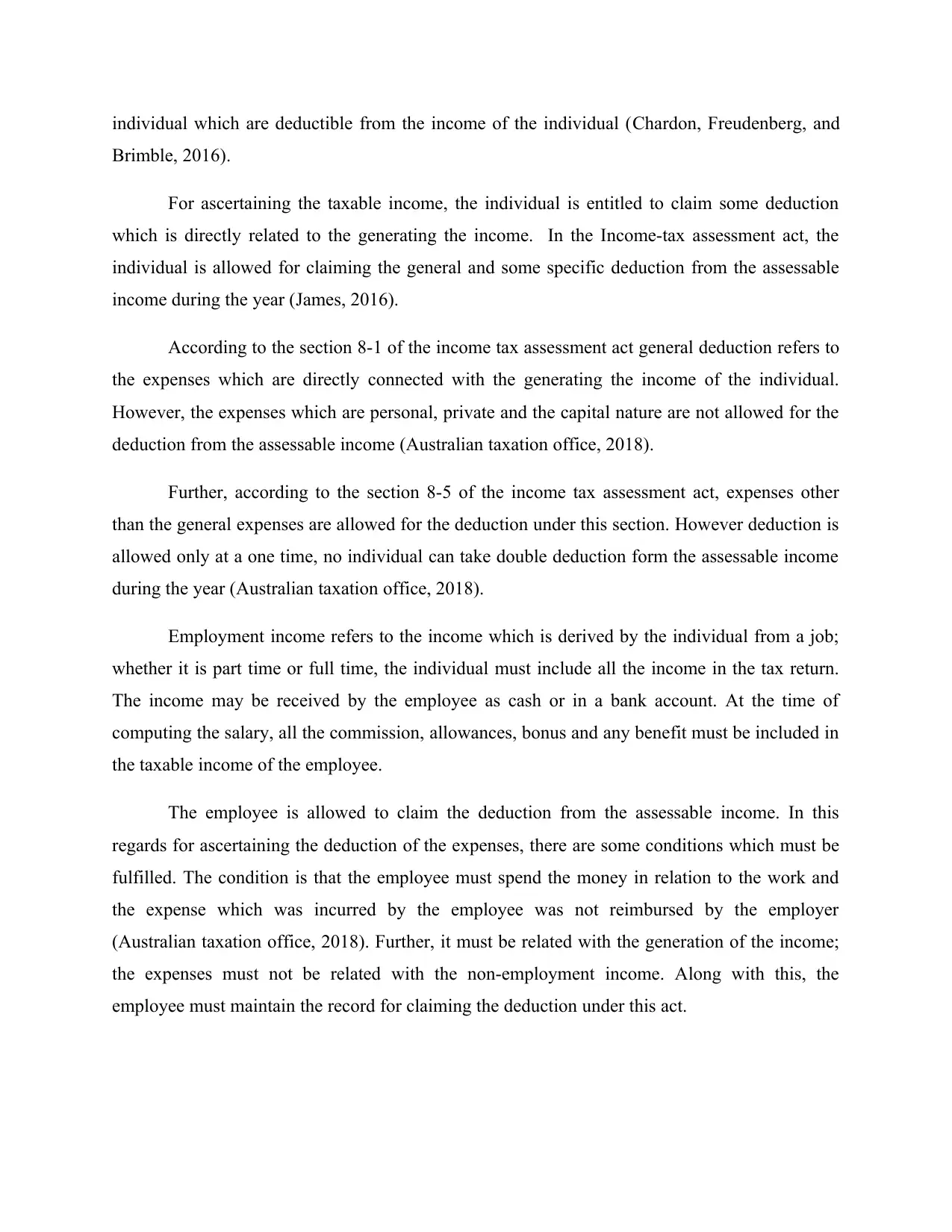
individual which are deductible from the income of the individual (Chardon, Freudenberg, and
Brimble, 2016).
For ascertaining the taxable income, the individual is entitled to claim some deduction
which is directly related to the generating the income. In the Income-tax assessment act, the
individual is allowed for claiming the general and some specific deduction from the assessable
income during the year (James, 2016).
According to the section 8-1 of the income tax assessment act general deduction refers to
the expenses which are directly connected with the generating the income of the individual.
However, the expenses which are personal, private and the capital nature are not allowed for the
deduction from the assessable income (Australian taxation office, 2018).
Further, according to the section 8-5 of the income tax assessment act, expenses other
than the general expenses are allowed for the deduction under this section. However deduction is
allowed only at a one time, no individual can take double deduction form the assessable income
during the year (Australian taxation office, 2018).
Employment income refers to the income which is derived by the individual from a job;
whether it is part time or full time, the individual must include all the income in the tax return.
The income may be received by the employee as cash or in a bank account. At the time of
computing the salary, all the commission, allowances, bonus and any benefit must be included in
the taxable income of the employee.
The employee is allowed to claim the deduction from the assessable income. In this
regards for ascertaining the deduction of the expenses, there are some conditions which must be
fulfilled. The condition is that the employee must spend the money in relation to the work and
the expense which was incurred by the employee was not reimbursed by the employer
(Australian taxation office, 2018). Further, it must be related with the generation of the income;
the expenses must not be related with the non-employment income. Along with this, the
employee must maintain the record for claiming the deduction under this act.
Brimble, 2016).
For ascertaining the taxable income, the individual is entitled to claim some deduction
which is directly related to the generating the income. In the Income-tax assessment act, the
individual is allowed for claiming the general and some specific deduction from the assessable
income during the year (James, 2016).
According to the section 8-1 of the income tax assessment act general deduction refers to
the expenses which are directly connected with the generating the income of the individual.
However, the expenses which are personal, private and the capital nature are not allowed for the
deduction from the assessable income (Australian taxation office, 2018).
Further, according to the section 8-5 of the income tax assessment act, expenses other
than the general expenses are allowed for the deduction under this section. However deduction is
allowed only at a one time, no individual can take double deduction form the assessable income
during the year (Australian taxation office, 2018).
Employment income refers to the income which is derived by the individual from a job;
whether it is part time or full time, the individual must include all the income in the tax return.
The income may be received by the employee as cash or in a bank account. At the time of
computing the salary, all the commission, allowances, bonus and any benefit must be included in
the taxable income of the employee.
The employee is allowed to claim the deduction from the assessable income. In this
regards for ascertaining the deduction of the expenses, there are some conditions which must be
fulfilled. The condition is that the employee must spend the money in relation to the work and
the expense which was incurred by the employee was not reimbursed by the employer
(Australian taxation office, 2018). Further, it must be related with the generation of the income;
the expenses must not be related with the non-employment income. Along with this, the
employee must maintain the record for claiming the deduction under this act.
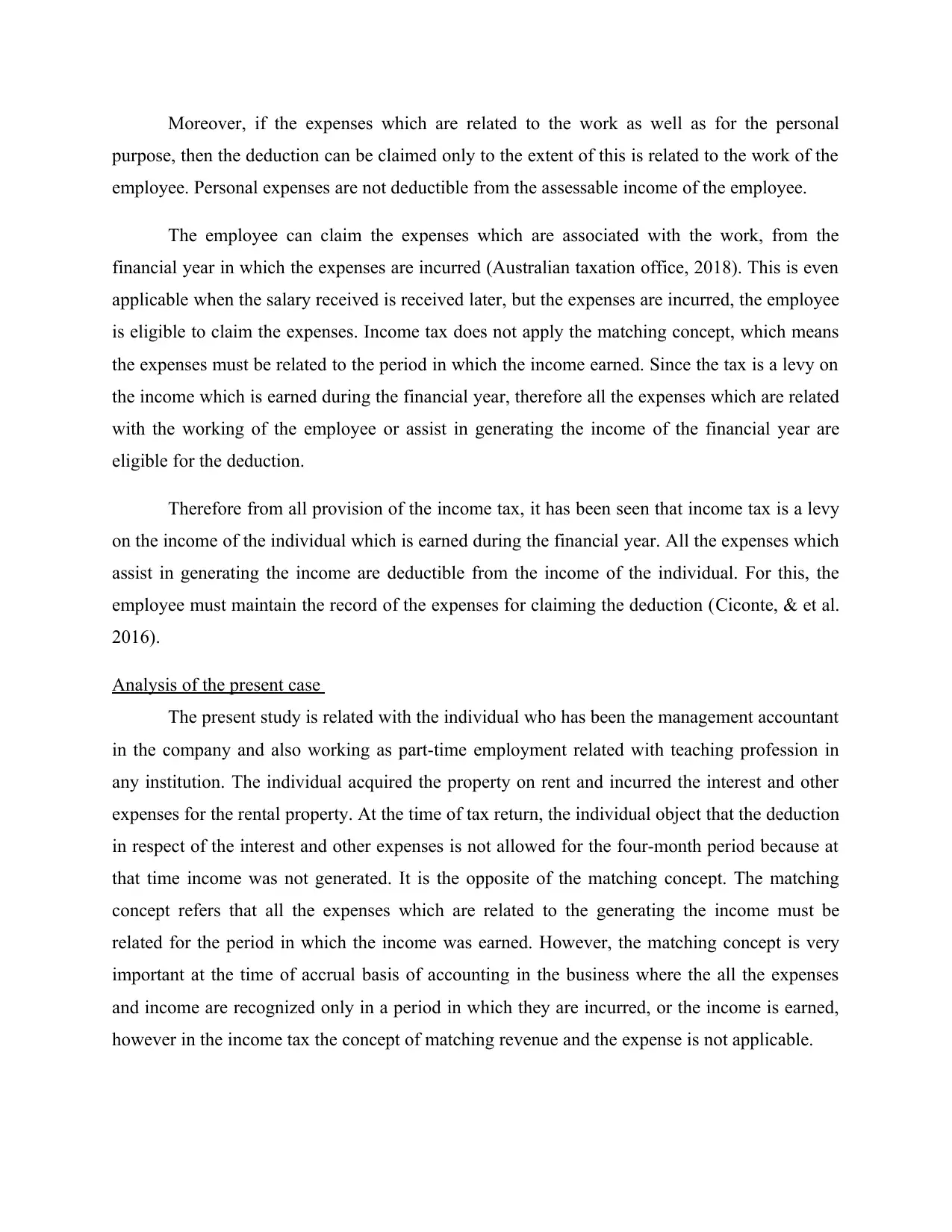
Moreover, if the expenses which are related to the work as well as for the personal
purpose, then the deduction can be claimed only to the extent of this is related to the work of the
employee. Personal expenses are not deductible from the assessable income of the employee.
The employee can claim the expenses which are associated with the work, from the
financial year in which the expenses are incurred (Australian taxation office, 2018). This is even
applicable when the salary received is received later, but the expenses are incurred, the employee
is eligible to claim the expenses. Income tax does not apply the matching concept, which means
the expenses must be related to the period in which the income earned. Since the tax is a levy on
the income which is earned during the financial year, therefore all the expenses which are related
with the working of the employee or assist in generating the income of the financial year are
eligible for the deduction.
Therefore from all provision of the income tax, it has been seen that income tax is a levy
on the income of the individual which is earned during the financial year. All the expenses which
assist in generating the income are deductible from the income of the individual. For this, the
employee must maintain the record of the expenses for claiming the deduction (Ciconte, & et al.
2016).
Analysis of the present case
The present study is related with the individual who has been the management accountant
in the company and also working as part-time employment related with teaching profession in
any institution. The individual acquired the property on rent and incurred the interest and other
expenses for the rental property. At the time of tax return, the individual object that the deduction
in respect of the interest and other expenses is not allowed for the four-month period because at
that time income was not generated. It is the opposite of the matching concept. The matching
concept refers that all the expenses which are related to the generating the income must be
related for the period in which the income was earned. However, the matching concept is very
important at the time of accrual basis of accounting in the business where the all the expenses
and income are recognized only in a period in which they are incurred, or the income is earned,
however in the income tax the concept of matching revenue and the expense is not applicable.
purpose, then the deduction can be claimed only to the extent of this is related to the work of the
employee. Personal expenses are not deductible from the assessable income of the employee.
The employee can claim the expenses which are associated with the work, from the
financial year in which the expenses are incurred (Australian taxation office, 2018). This is even
applicable when the salary received is received later, but the expenses are incurred, the employee
is eligible to claim the expenses. Income tax does not apply the matching concept, which means
the expenses must be related to the period in which the income earned. Since the tax is a levy on
the income which is earned during the financial year, therefore all the expenses which are related
with the working of the employee or assist in generating the income of the financial year are
eligible for the deduction.
Therefore from all provision of the income tax, it has been seen that income tax is a levy
on the income of the individual which is earned during the financial year. All the expenses which
assist in generating the income are deductible from the income of the individual. For this, the
employee must maintain the record of the expenses for claiming the deduction (Ciconte, & et al.
2016).
Analysis of the present case
The present study is related with the individual who has been the management accountant
in the company and also working as part-time employment related with teaching profession in
any institution. The individual acquired the property on rent and incurred the interest and other
expenses for the rental property. At the time of tax return, the individual object that the deduction
in respect of the interest and other expenses is not allowed for the four-month period because at
that time income was not generated. It is the opposite of the matching concept. The matching
concept refers that all the expenses which are related to the generating the income must be
related for the period in which the income was earned. However, the matching concept is very
important at the time of accrual basis of accounting in the business where the all the expenses
and income are recognized only in a period in which they are incurred, or the income is earned,
however in the income tax the concept of matching revenue and the expense is not applicable.
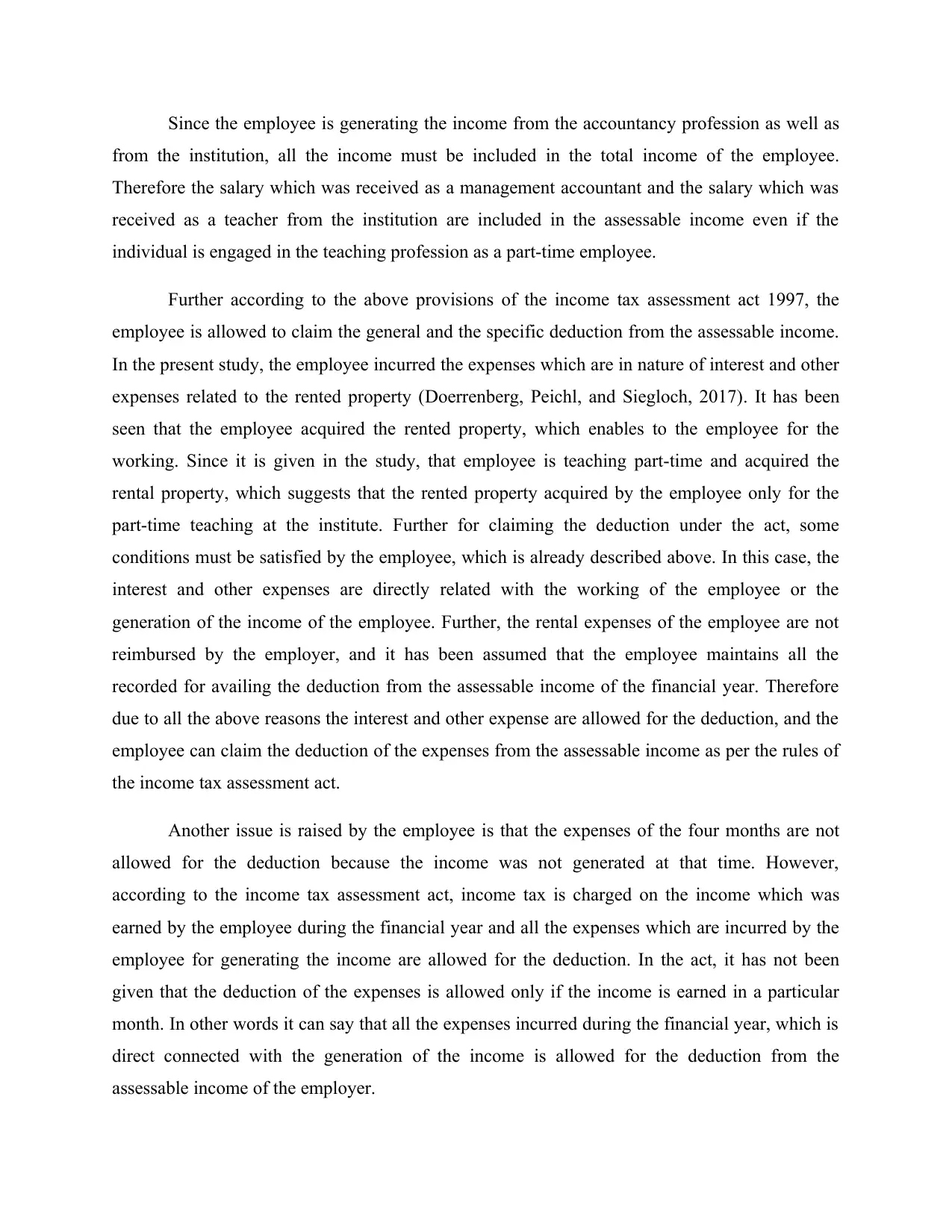
Since the employee is generating the income from the accountancy profession as well as
from the institution, all the income must be included in the total income of the employee.
Therefore the salary which was received as a management accountant and the salary which was
received as a teacher from the institution are included in the assessable income even if the
individual is engaged in the teaching profession as a part-time employee.
Further according to the above provisions of the income tax assessment act 1997, the
employee is allowed to claim the general and the specific deduction from the assessable income.
In the present study, the employee incurred the expenses which are in nature of interest and other
expenses related to the rented property (Doerrenberg, Peichl, and Siegloch, 2017). It has been
seen that the employee acquired the rented property, which enables to the employee for the
working. Since it is given in the study, that employee is teaching part-time and acquired the
rental property, which suggests that the rented property acquired by the employee only for the
part-time teaching at the institute. Further for claiming the deduction under the act, some
conditions must be satisfied by the employee, which is already described above. In this case, the
interest and other expenses are directly related with the working of the employee or the
generation of the income of the employee. Further, the rental expenses of the employee are not
reimbursed by the employer, and it has been assumed that the employee maintains all the
recorded for availing the deduction from the assessable income of the financial year. Therefore
due to all the above reasons the interest and other expense are allowed for the deduction, and the
employee can claim the deduction of the expenses from the assessable income as per the rules of
the income tax assessment act.
Another issue is raised by the employee is that the expenses of the four months are not
allowed for the deduction because the income was not generated at that time. However,
according to the income tax assessment act, income tax is charged on the income which was
earned by the employee during the financial year and all the expenses which are incurred by the
employee for generating the income are allowed for the deduction. In the act, it has not been
given that the deduction of the expenses is allowed only if the income is earned in a particular
month. In other words it can say that all the expenses incurred during the financial year, which is
direct connected with the generation of the income is allowed for the deduction from the
assessable income of the employer.
from the institution, all the income must be included in the total income of the employee.
Therefore the salary which was received as a management accountant and the salary which was
received as a teacher from the institution are included in the assessable income even if the
individual is engaged in the teaching profession as a part-time employee.
Further according to the above provisions of the income tax assessment act 1997, the
employee is allowed to claim the general and the specific deduction from the assessable income.
In the present study, the employee incurred the expenses which are in nature of interest and other
expenses related to the rented property (Doerrenberg, Peichl, and Siegloch, 2017). It has been
seen that the employee acquired the rented property, which enables to the employee for the
working. Since it is given in the study, that employee is teaching part-time and acquired the
rental property, which suggests that the rented property acquired by the employee only for the
part-time teaching at the institute. Further for claiming the deduction under the act, some
conditions must be satisfied by the employee, which is already described above. In this case, the
interest and other expenses are directly related with the working of the employee or the
generation of the income of the employee. Further, the rental expenses of the employee are not
reimbursed by the employer, and it has been assumed that the employee maintains all the
recorded for availing the deduction from the assessable income of the financial year. Therefore
due to all the above reasons the interest and other expense are allowed for the deduction, and the
employee can claim the deduction of the expenses from the assessable income as per the rules of
the income tax assessment act.
Another issue is raised by the employee is that the expenses of the four months are not
allowed for the deduction because the income was not generated at that time. However,
according to the income tax assessment act, income tax is charged on the income which was
earned by the employee during the financial year and all the expenses which are incurred by the
employee for generating the income are allowed for the deduction. In the act, it has not been
given that the deduction of the expenses is allowed only if the income is earned in a particular
month. In other words it can say that all the expenses incurred during the financial year, which is
direct connected with the generation of the income is allowed for the deduction from the
assessable income of the employer.
Secure Best Marks with AI Grader
Need help grading? Try our AI Grader for instant feedback on your assignments.
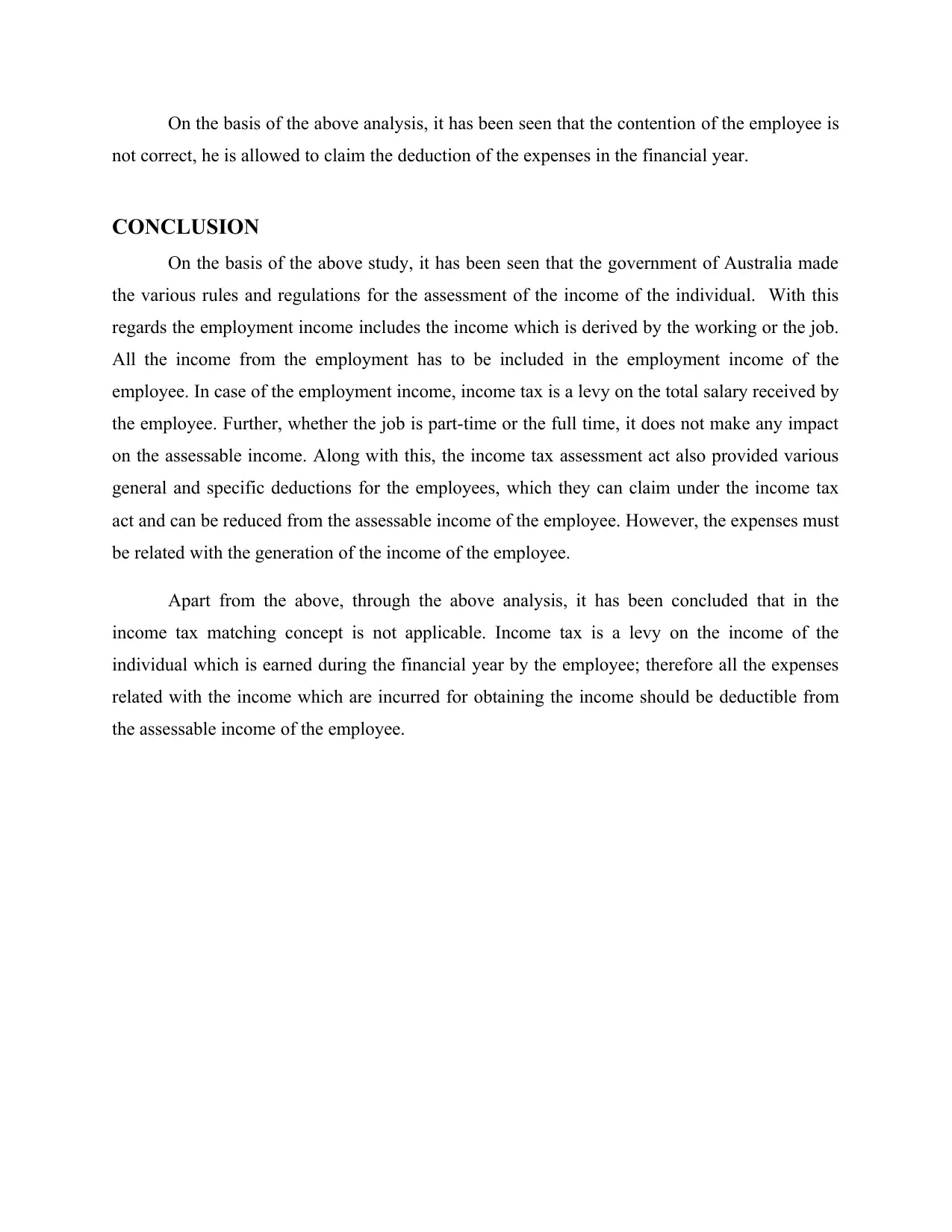
On the basis of the above analysis, it has been seen that the contention of the employee is
not correct, he is allowed to claim the deduction of the expenses in the financial year.
CONCLUSION
On the basis of the above study, it has been seen that the government of Australia made
the various rules and regulations for the assessment of the income of the individual. With this
regards the employment income includes the income which is derived by the working or the job.
All the income from the employment has to be included in the employment income of the
employee. In case of the employment income, income tax is a levy on the total salary received by
the employee. Further, whether the job is part-time or the full time, it does not make any impact
on the assessable income. Along with this, the income tax assessment act also provided various
general and specific deductions for the employees, which they can claim under the income tax
act and can be reduced from the assessable income of the employee. However, the expenses must
be related with the generation of the income of the employee.
Apart from the above, through the above analysis, it has been concluded that in the
income tax matching concept is not applicable. Income tax is a levy on the income of the
individual which is earned during the financial year by the employee; therefore all the expenses
related with the income which are incurred for obtaining the income should be deductible from
the assessable income of the employee.
not correct, he is allowed to claim the deduction of the expenses in the financial year.
CONCLUSION
On the basis of the above study, it has been seen that the government of Australia made
the various rules and regulations for the assessment of the income of the individual. With this
regards the employment income includes the income which is derived by the working or the job.
All the income from the employment has to be included in the employment income of the
employee. In case of the employment income, income tax is a levy on the total salary received by
the employee. Further, whether the job is part-time or the full time, it does not make any impact
on the assessable income. Along with this, the income tax assessment act also provided various
general and specific deductions for the employees, which they can claim under the income tax
act and can be reduced from the assessable income of the employee. However, the expenses must
be related with the generation of the income of the employee.
Apart from the above, through the above analysis, it has been concluded that in the
income tax matching concept is not applicable. Income tax is a levy on the income of the
individual which is earned during the financial year by the employee; therefore all the expenses
related with the income which are incurred for obtaining the income should be deductible from
the assessable income of the employee.
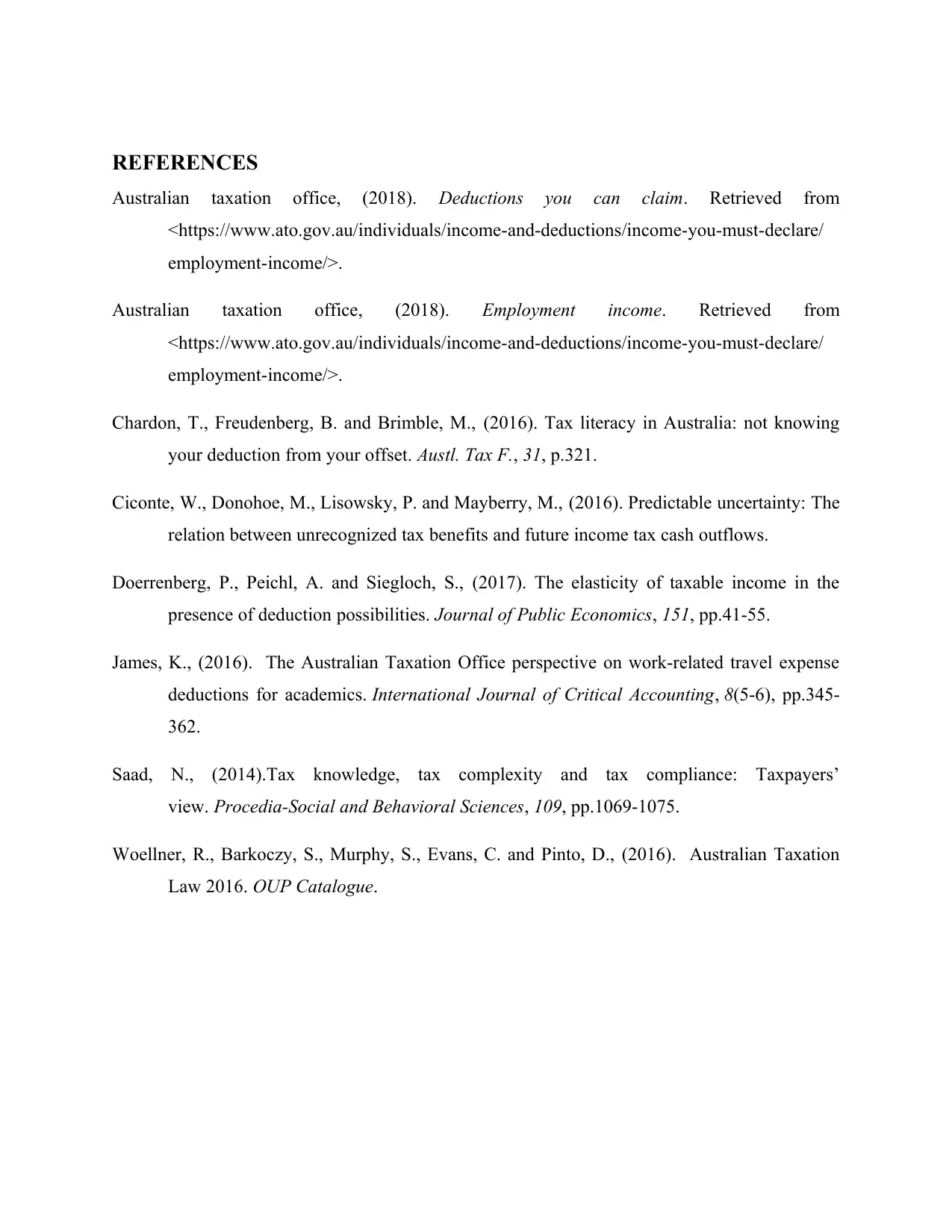
REFERENCES
Australian taxation office, (2018). Deductions you can claim. Retrieved from
<https://www.ato.gov.au/individuals/income-and-deductions/income-you-must-declare/
employment-income/>.
Australian taxation office, (2018). Employment income. Retrieved from
<https://www.ato.gov.au/individuals/income-and-deductions/income-you-must-declare/
employment-income/>.
Chardon, T., Freudenberg, B. and Brimble, M., (2016). Tax literacy in Australia: not knowing
your deduction from your offset. Austl. Tax F., 31, p.321.
Ciconte, W., Donohoe, M., Lisowsky, P. and Mayberry, M., (2016). Predictable uncertainty: The
relation between unrecognized tax benefits and future income tax cash outflows.
Doerrenberg, P., Peichl, A. and Siegloch, S., (2017). The elasticity of taxable income in the
presence of deduction possibilities. Journal of Public Economics, 151, pp.41-55.
James, K., (2016). The Australian Taxation Office perspective on work-related travel expense
deductions for academics. International Journal of Critical Accounting, 8(5-6), pp.345-
362.
Saad, N., (2014).Tax knowledge, tax complexity and tax compliance: Taxpayers’
view. Procedia-Social and Behavioral Sciences, 109, pp.1069-1075.
Woellner, R., Barkoczy, S., Murphy, S., Evans, C. and Pinto, D., (2016). Australian Taxation
Law 2016. OUP Catalogue.
Australian taxation office, (2018). Deductions you can claim. Retrieved from
<https://www.ato.gov.au/individuals/income-and-deductions/income-you-must-declare/
employment-income/>.
Australian taxation office, (2018). Employment income. Retrieved from
<https://www.ato.gov.au/individuals/income-and-deductions/income-you-must-declare/
employment-income/>.
Chardon, T., Freudenberg, B. and Brimble, M., (2016). Tax literacy in Australia: not knowing
your deduction from your offset. Austl. Tax F., 31, p.321.
Ciconte, W., Donohoe, M., Lisowsky, P. and Mayberry, M., (2016). Predictable uncertainty: The
relation between unrecognized tax benefits and future income tax cash outflows.
Doerrenberg, P., Peichl, A. and Siegloch, S., (2017). The elasticity of taxable income in the
presence of deduction possibilities. Journal of Public Economics, 151, pp.41-55.
James, K., (2016). The Australian Taxation Office perspective on work-related travel expense
deductions for academics. International Journal of Critical Accounting, 8(5-6), pp.345-
362.
Saad, N., (2014).Tax knowledge, tax complexity and tax compliance: Taxpayers’
view. Procedia-Social and Behavioral Sciences, 109, pp.1069-1075.
Woellner, R., Barkoczy, S., Murphy, S., Evans, C. and Pinto, D., (2016). Australian Taxation
Law 2016. OUP Catalogue.

1 out of 7
Related Documents
Your All-in-One AI-Powered Toolkit for Academic Success.
+13062052269
info@desklib.com
Available 24*7 on WhatsApp / Email
![[object Object]](/_next/static/media/star-bottom.7253800d.svg)
Unlock your academic potential
© 2024 | Zucol Services PVT LTD | All rights reserved.




